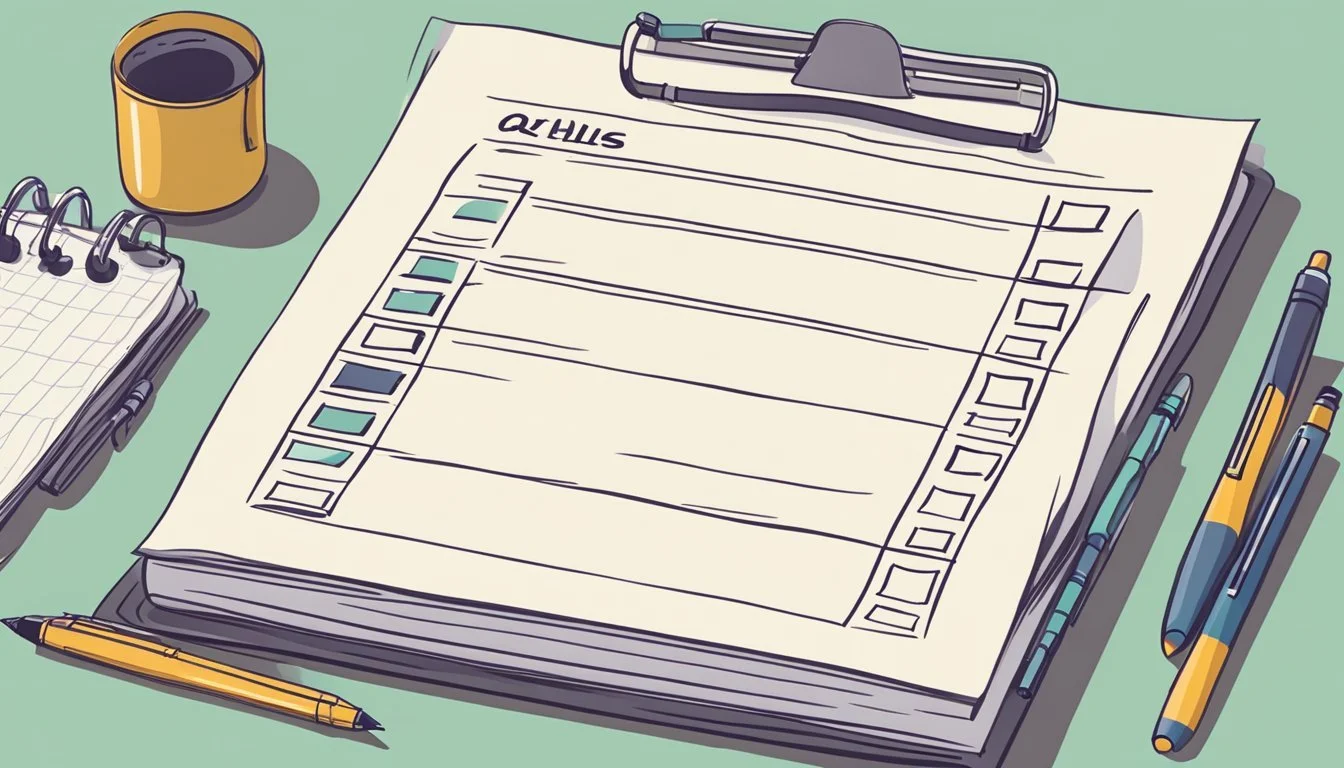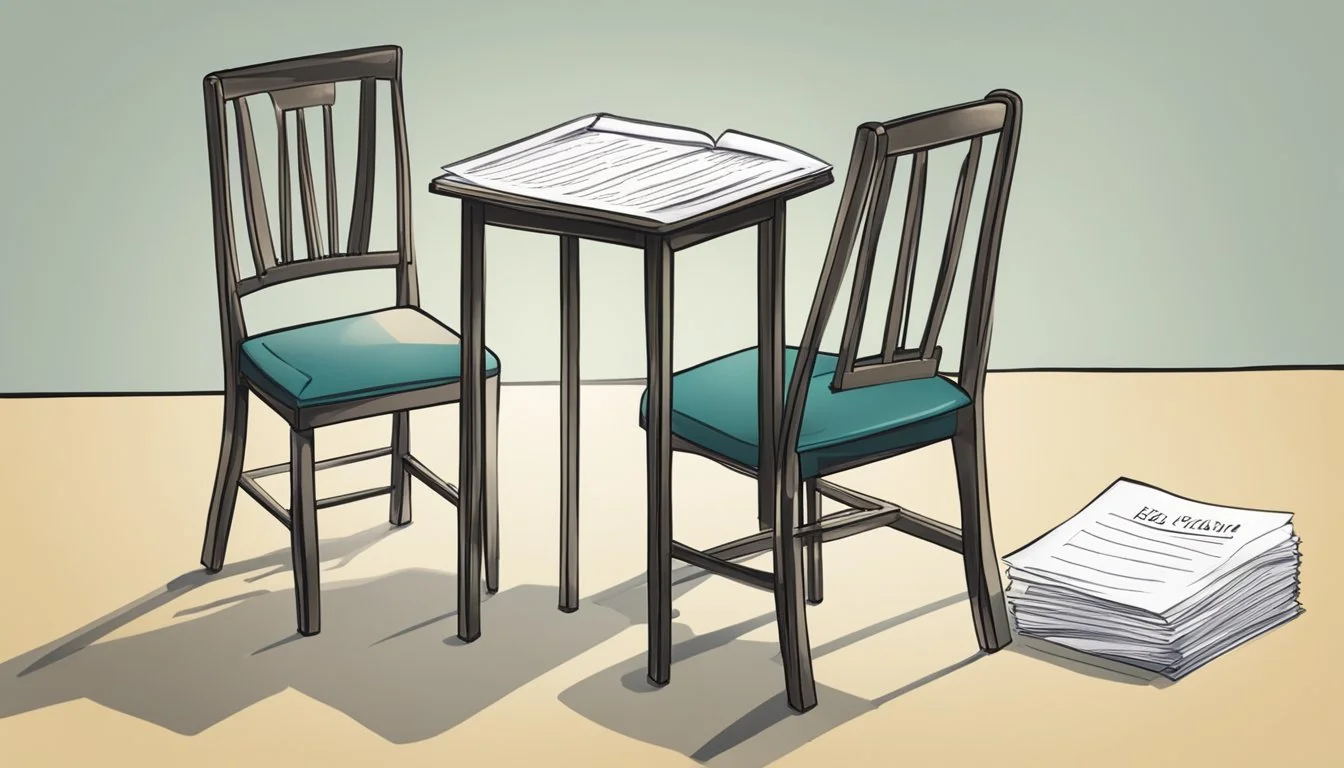18 Questions to Ask Yourself Before Ending a Relationship
A Thoughtful Guide
Deciding whether to end a relationship is a complex and emotionally challenging process. People often find themselves questioning their feelings, the longevity of their issues, and if there is a future with their partner. Navigating through this period requires introspection and honesty, which can be facilitated by asking the right questions.
These questions are designed to help individuals understand the true state of their relationship. They offer a structured approach to assess if the partnership still serves their emotional and psychological needs. This thoughtful inquiry not only aids in making an informed decision but also ensures that whatever the outcome, it is reached with clarity and confidence.
1) Do I Still Love My Partner?
He or she should start by asking, "Do I still love my partner?" This question is fundamental in evaluating the potential end of a relationship.
Love is a complex emotion that can change forms over time. It's important to consider whether the feelings are affectionate and warm or if they have shifted to indifference.
Reflecting on moments that brought joy and satisfaction in the relationship might help. Were there times that brought genuine happiness and connection?
They should also consider if they feel hopeful about a future together. Imagining a life without their partner can provide insight into the depth of their feelings.
Sometimes, the daily routines and stress can overshadow true emotions. Taking a step back to assess feelings can clarify whether love remains or has faded.
Contemplating whether actions are motivated by love or obligation is crucial. Acts of kindness and support can be telling indicators of lingering affection.
Asking this question promotes self-awareness and enables one to gauge the vitality of their emotions, which is essential for making an informed decision about the relationship's future.
2) Are my needs being met?
In any relationship, it is crucial to reflect on whether your essential needs are being fulfilled. This includes emotional support, communication, trust, intimacy, and respect. Each of these elements plays a significant role in maintaining a healthy partnership.
Consider your emotional needs. Do you feel valued and understood by your partner? Emotional support is vital for a strong connection, helping to navigate life's challenges together.
Communication is another key aspect. Effective communication fosters understanding and helps resolve conflicts. Assess whether you and your partner can openly express your thoughts and feelings without fear of judgment.
Trust is foundational to any relationship. Ask yourself if you can rely on your partner and whether they maintain honesty and transparency. A lack of trust can erode the relationship over time.
Intimacy goes beyond physical connection. It encompasses emotional closeness and shared experiences. Reflect on whether your relationship includes moments of genuine intimacy and connection.
Respect is non-negotiable. It involves acknowledging each other’s boundaries and treating each other with consideration. Evaluate if your partner respects your opinions, values, and personal space.
If many of these needs are unmet, it may be a sign to reassess the relationship. Understanding your needs helps you make informed decisions about the future of your relationship.
3) Have we tried to resolve our issues?
Examining whether attempts at resolving relationship issues have been made is crucial. Communication stands at the heart of any relationship. Open dialogues about concerns and conflicts play a significant role in moving forward.
Couples often benefit from seeking external help. Professionals such as therapists can facilitate discussions that might be challenging to navigate alone. This external perspective can be invaluable.
Assess the efforts made toward compromise. Meeting halfway on contentious points may indicate a willingness to work through problems. Recognizing each other’s needs and finding mutual solutions can be a strong indicator of commitment.
Reflect on actions taken to address core issues. Affirm whether both partners have actively contributed to resolving conflicts. This reflection can reveal the health and potential of the relationship.
By answering these questions, one can gain clarity on the efforts invested in maintaining the bond. For further insights, UpJourney provides a comprehensive guide on discussing potential issues with a partner.
4) Am I staying out of fear?
Fear can play a significant role in decision-making, particularly in relationships. If someone is staying just because they're afraid of being alone, it's essential to address this feeling directly.
Fear of loneliness can compel individuals to maintain unhealthy relationships. This fear might stem from various factors such as societal pressures, perceived dependence on the partner, or a lack of self-confidence.
Common fears include financial instability, social stigma, or the dread of starting over. Recognizing these fears can help decide whether the relationship is worth continuing or if it's time to move on.
Identifying whether the fear is rational or irrational can be illuminating. For instance, practical fears related to financial dependency might be addressed through planning and support.
It’s crucial to differentiate between fear and genuine affection. Ensuring one's reasons for staying are based on love and compatibility rather than just avoiding discomfort is vital for a healthy relationship.
Reflecting on personal motivations and validating one's feelings can clarify this decision. Seeking support from trusted friends or mental health professionals can also provide valuable perspective.
5) Do I feel respected?
Respect is fundamental in any relationship. It involves feeling valued and appreciated by your partner. If she feels disregarded or patronized, it might be a sign that respect is lacking.
He should consider whether his opinions and feelings are taken into account. If she feels dismissed or belittled frequently, this can indicate a profound lack of respect.
Respect also means that boundaries are honored. If his partner often pushes these limits, it demonstrates a disregard for her autonomy and needs.
Review if past conflicts have been resolved respectfully or if they consistently result in hurtful behavior. Patterns of disrespect during arguments are a significant red flag.
She needs to assess whether her partner acknowledges her accomplishments. Failing to celebrate or support successes can impact her self-worth and reflect underlying disrespect.
Being listened to attentively without interruption is another key factor. If he feels constantly misunderstood or unheard, this can be a sign of disrespect.
To explore this further, individuals might find it helpful to read about strategies for ensuring mutual respect in relationships, such as those discussed in articles like this one.
6) Can I see a future together?
Thinking about the future is crucial when evaluating a relationship. He or she should consider whether they can envision a long-term partnership. This involves picturing both the good times and potential challenges.
It's important to assess if their partner shares similar goals and values. They should think about their life plans, such as marriage, career aspirations, and having children.
Reflecting on compatibility is essential. They should ask themselves if they see their partner in their future. If the idea of a future together feels uncertain or doesn’t align with personal goals, it may indicate deeper issues.
They can also consider their emotions. If thinking of long-term plans with their partner brings joy and excitement, it's a positive sign. If it creates tension or doubt, it’s worth exploring further.
7) How does my partner make me feel?
Evaluating how a partner makes one feel is crucial. It's important to consider both positive and negative emotions that arise during interactions.
Feelings of happiness and security can indicate a healthy relationship. If a partner frequently brings joy and comfort, it suggests a nurturing environment.
On the other hand, persistent feelings of sadness, anxiety, or frustration may signal deeper issues. If someone feels constantly undermined or unappreciated, it could be a red flag.
It's also vital to assess how often one feels supported and understood. Feeling heard and valued promotes emotional well-being. If these feelings are absent, the relationship might need reassessment.
Reflecting on emotional responses during both calm and challenging times provides insight. Consistent negativity or emotional neglect shouldn't be ignored.
Understanding one's emotional state in the relationship offers clarity and guides decisions. If emotions are primarily positive, it could validate staying. Negative emotions might indicate it's time to part ways.
8) Am I growing as an individual?
One critical question is whether the relationship supports personal growth. Individuals should reflect on whether they feel encouraged and inspired by their partner to pursue personal goals and interests.
Growth might involve advancing in a career, learning new skills, or simply becoming a better version of oneself. A supportive relationship should ideally facilitate this progress rather than impede it.
Assess if there are opportunities for growth that are being neglected due to the relationship. It's essential to consider if the partner provides the necessary encouragement and motivation to pursue these opportunities.
It's also important to evaluate if any sacrifices made for the relationship are hindering personal development. Individuals should ask themselves if the compromises are reasonable or if they are holding back personal advancement significantly.
Additionally, consider if the relationship offers a balanced dynamic where both partners grow together. Mutual growth is a positive sign that the relationship is beneficial for both individuals involved.
If any aspect of personal growth feels stunted or overlooked, it could be a sign that the relationship needs to be re-evaluated. It's important to ensure that personal development is not compromised for the sake of the relationship.
9) Is the relationship balanced?
A balanced relationship requires equal investment from both partners. An individual should ask if both parties put in similar amounts of time, effort, and emotional support. Consider whether responsibilities and daily tasks are shared or if one person consistently shoulders more.
Evaluate if decisions are jointly made or if one partner tends to dominate. This includes both major life choices and smaller, everyday decisions. Mutual respect and consideration in decision-making are hallmarks of an equitable partnership.
Observe whether personal needs and boundaries are acknowledged and respected by both partners. If one person frequently compromises their needs or feels theirs are dismissed, it may indicate an imbalance.
Reflect on the reciprocity of emotional support. Are both partners equally available to listen, empathize, and offer encouragement? It’s important for emotional give-and-take to be consistent and meaningful.
In assessing these factors, he or she can gain insight into whether the relationship operates on a foundation of equality and mutual respect. This understanding is critical for determining the sustainability and health of the partnership.
10) How do we handle conflicts?
Understanding how conflicts are managed in a relationship is crucial. Conflicts are inevitable, but the way they are addressed speaks volumes about the stability and health of the partnership. Do they address issues constructively, or do arguments often escalate to unproductive levels?
Effective conflict resolution involves empathy and compassionate communication. Each partner should listen actively to the other's concerns, express their own feelings clearly, and work towards a mutual understanding. Ignoring issues or harboring resentment can lead to further problems down the line.
Seeking external help, such as a couples therapist, can be beneficial if conflicts consistently go unresolved. Professional guidance offers a neutral space for both parties to express themselves without fear of judgment or defensiveness.
Frequent, unresolved conflicts may indicate underlying issues that need more attention. Healthy conflict resolution involves compromise and respect for each other's perspectives and feelings.
It’s essential to reflect on whether both partners are willing to work together to resolve conflicts. A relationship where one or both parties refuse to engage in meaningful dialogue can be challenging to sustain in the long term. Check if there is a pattern of constructive conflict resolution or if disputes lead to lingering negativity and resentment.
Addressing this question can provide insight into the dynamics of the relationship and help assess its future potential.
For more detailed advice and useful questions to help resolve conflict, visit 42 Questions To Help Resolve Conflict.
11) Am I happy more often than not?
Assessing one’s happiness in a relationship involves reflecting on daily emotions and overall satisfaction. He should consider if positive feelings outnumber the negatives.
Sometimes, external stressors can cloud judgment. It is essential to differentiate between relationship-induced unhappiness and external factors.
She might recall specific instances where the relationship brought joy. These happy memories can indicate patterns of overall contentment.
Conversely, if conflicts, dissatisfaction, or sadness dominate, it might signal deeper issues. Frequent feelings of restiveness can suggest an unhealthy dynamic.
He should prioritize his mental well-being. If sadness or frustration is prominent, this can affect every aspect of life.
Understanding happiness patterns helps determine the relationship’s impact. This step is key in making informed decisions about the future.
Overall, assessing happiness regularly ensures he is aware of his emotional state. This awareness supports healthier relationships.
12) Do I trust my partner?
Trust forms the foundation of any strong relationship. Without trust, doubts and insecurities can grow, affecting how partners interact and feel about each other.
Evaluate if there have been consistent breaches of trust. This could include actions like lying, keeping secrets, or being unfaithful. Consider how these incidents have impacted your ability to trust your partner.
Think about the daily interactions. Are there moments when you feel uncertain about their intentions or honesty? Consistent, small actions can either build or erode trust over time.
Reflect on whether your partner has been dependable and supportive. Reliable behavior often strengthens trust, while repeated disappointments might weaken it.
Take into account your own insecurities and past experiences. Personal history can sometimes cloud judgment, making it harder to trust even when there is no reason to doubt.
Discuss your feelings with your partner openly. Honest conversations about trust can reveal underlying issues and help both partners understand each other better. If the trust has been damaged, it might require time and effort to rebuild.
Trust is crucial for emotional safety and stability. Assessing whether you trust your partner can guide you in making decisions about the future of your relationship. For more insights, read here.
13) Are our goals aligned?
When considering the future of a relationship, assessing whether goals align is crucial. Both partners may have different aspirations for their careers, family life, or personal growth.
If one partner dreams of extensive travel but the other prefers stability and a home base, conflicts can arise. These differing dreams might lead to misunderstandings and dissatisfaction.
Discussing long-term plans, such as career ambitions, views on marriage, and opinions about having children, can reveal potential misalignments. This dialogue helps identify whether both partners are moving in the same direction.
Sometimes, goals can evolve. One partner may change career aspirations or develop new interests that impact their shared path. Regular discussions about evolving goals can ensure both partners remain on the same page.
Differences in financial goals also matter. One partner might value saving for the future, while the other prioritizes enjoying the present. This discrepancy can cause tension if not addressed.
It’s important to consider how adaptable both partners are. Flexibility can help resolve some differences in goals, but a significant divergence might be harder to bridge.
For more insights on aligning goals in a relationship, check out these questions to ask your partner before ending a relationship.
14) Can we communicate effectively?
Effective communication serves as the backbone of any healthy relationship. It determines whether both partners can understand each other’s needs and resolve conflicts constructively.
Poor communication often leads to misunderstandings and frustration. In a strained relationship, asking if open, honest conversations are possible is crucial.
Listening actively is as important as speaking clearly. Both partners should feel heard and valued to foster mutual respect.
If communication has been an ongoing challenge, it might be necessary to evaluate if these issues can be improved. Tools like active listening and setting aside time for meaningful conversations may help.
Practicing empathy in discussions can also significantly bridge gaps. Understanding a partner's perspective can defuse tensions and promote harmony.
Consider whether there’s a willingness from both sides to work on these skills. Joint effort in improving communication can enhance relationship resilience.
Don't overlook the importance of non-verbal cues. Body language, eye contact, and facial expressions often convey messages as powerfully as words.
Regularly checking in with each other about feelings and concerns can prevent minor issues from becoming major roadblocks. Open dialogues can lead to stronger, more fulfilling connections.
15) Do I enjoy spending time with my partner?
Assessing the enjoyment of spending time with a partner can reveal much about the state of a relationship. Genuine enjoyment often indicates a healthy, fulfilling bond. It is essential to reflect on whether shared moments bring joy and satisfaction.
Consider the activities and experiences shared with the partner. Are these moments pleasurable and fulfilling, or do they feel burdensome? Enjoying time together signifies emotional connection and compatibility.
Think about the feelings that arise during and after spending time together. Positive emotions such as contentment, happiness, and relaxation suggest a strong connection. In contrast, negative feelings or constant tension may indicate underlying issues.
Reflect on whether there is a mutual interest in shared activities. If both partners look forward to spending time together and engaging in mutual interests, it can signal harmony and happiness in the relationship.
Additionally, consider if there is a sense of companionship and support during time spent together. Feeling supported and understood enhances relationship satisfaction and emotional well-being.
Ultimately, the enjoyment of spending time with a partner is a crucial element in any relationship. Frequent joyful and fulfilling experiences together often lead to a deeper, more resilient connection. If such enjoyment is absent, it may be an indicator of unaddressed concerns or relational discord.
16) Have I lost interest?
When examining whether interest in the relationship has waned, it’s crucial to consider personal feelings and experiences.
One way to evaluate this is to reflect on emotional engagement. Has interaction with the partner become a chore? Do once-enjoyable activities now feel tiresome or obligatory?
Another key indicator involves communication. Is there a noticeable decline in the desire to share thoughts, dreams, or daily events? A lack of interest in these intimate exchanges often signals deeper issues.
Physical affection is another area to scrutinize. Has there been a reduction in the desire for physical closeness, such as hugs, kisses, or other signs of affection? This can point towards a diminished emotional connection.
Interest can also be measured by the level of excitement or anticipation felt about spending time together. If plans with the partner no longer bring joy or if other activities consistently take precedence, it may indicate lost interest.
Pay attention to daydreams or fantasies about life without the partner. If these thoughts are frequent and appealing, it’s a warning sign of disinterest.
Lastly, comparing the current emotional state with how things were at the beginning of the relationship can provide insights. Reflecting on the initial enthusiasm versus current feelings helps gauge the level of lost interest.
17) Are we both committed to improving?
Evaluating whether both partners are committed to improving the relationship is essential. It involves honest discussions about the willingness to work through issues. Both partners need to express a strong desire to make positive changes.
Commitment to improvement can manifest in various ways. This includes attending therapy sessions together or independently, reading relationship-focused books, and actively practicing better communication techniques.
Additionally, assessing past efforts to resolve conflicts can provide insights. Have both partners shown consistent efforts to address issues rather than avoid them? Recognizing these patterns helps determine the actual level of commitment.
This commitment also means being open to feedback. Both individuals need to be willing to listen and implement suggestions for the betterment of the relationship. Without mutual effort, progress becomes challenging.
Looking at significant changes or compromises made in the past also showcases dedication. Reflect on whether both partners have made sacrifices for each other in meaningful ways.
Consider whether both individuals are willing to take responsibility for their actions. Accountability is a crucial element in fostering a healthier relationship.
If either partner questions their willingness to actively participate in improvement, it might indicate deeper issues. Real commitment requires more than just words; it demands consistent, actionable efforts.
Understanding this aspect of the relationship can lead to clearer decisions about its future. For further insights, Marriage.com provides comprehensive questions to explore before ending a relationship.
18) Do I feel supported?
Feeling supported in a relationship is crucial for long-term happiness and stability. Emotional support can manifest through empathy, understanding, and encouragement in times of stress or challenge.
It's important to consider whether your partner listens to you and respects your feelings. This respect helps in fostering a safe emotional environment.
Support also includes practical help. Does your partner assist with daily tasks or responsibilities? Shared efforts can strengthen the partnership.
Mutual support should be balanced. Reflect on whether you both uplift each other equally. One-sided support can lead to feelings of resentment and imbalance.
Evaluating support requires honest reflection. Think about whether you feel valued and cared for in various aspects of your life. This can help determine the health of your relationship.
In moments of need, having a partner who stands by you can make a significant difference. It's essential to assess if your partner meets this need consistently.
If you find gaps in feeling supported, it might be necessary to address them openly with your partner. Communication can be a pivotal step towards improvement.
Understanding Your Emotions
Evaluating emotions is essential when considering ending a relationship. Figuring out how you truly feel and understanding your emotional ties helps in making well-informed decisions.
Identifying Your Feelings
To identify your feelings, start by reflecting on your emotions throughout the relationship. Ask yourself specific questions such as: "Am I often happy or sad around my partner?" and "Do I feel anxious or calm most of the time?" Regular patterns can provide clarity about your emotional state.
Journaling can also be helpful. Writing down your thoughts and feelings helps organize them and may reveal underlying issues or consistent feelings you hadn't previously noticed. It's also a useful tool for tracking how your emotions evolve over time, especially during significant events or conflicts.
Working with a mental health professional, like a therapist, can offer guided insights. They can help you explore your emotions without judgment and provide strategies to manage feelings that may be clouding your judgment. Another option is discussing your feelings with a trusted friend for an outside perspective.
Assessing Emotional Attachment
Assessing emotional attachment involves understanding the depth of your emotional bond with your partner. Start by considering how invested you feel in the relationship's future. Do you long to build more memories and experiences together, or do you feel indifferent about long-term plans?
Think about the comfort and security you gain from the relationship. Reflect on questions like: "Do I rely on my partner for emotional support?" and "How do I feel when we're apart?" These reflections can gauge your level of attachment and dependence.
Consider how changes in the relationship affect you. Are disagreements or separations particularly distressing? Understanding the intensity of your emotional response to these changes can highlight your attachment level. If deeply entrenched emotions are revealed, professional guidance may again be useful. Couples counseling or individual therapy can provide support in understanding and addressing these deep emotional ties.
Evaluating Relationship Dynamics
Assessing the dynamics of a relationship involves closely examining how partners communicate and resolve conflicts. Effective communication can prevent misunderstandings, while constructive conflict resolution maintains harmony.
Communication Patterns
Communication is fundamental in any relationship. It's essential to evaluate how partners express their needs and concerns. Are conversations open and honest, or do they often lead to misunderstandings?
Active Listening: Each partner should feel heard. Active listening involves paying full attention to the speaker, reflecting back what they've said, and responding thoughtfully.
Non-Verbal Cues: Body language, tone, and eye contact often convey more than words. Simple gestures like nodding or maintaining eye contact can signify engagement and understanding.
Consistency and Clarity: Clear and consistent communication helps prevent confusion. Mixed signals can lead to unnecessary stress and conflict. Partners should strive to convey their feelings and thoughts directly.
Conflict Resolution
Healthy conflict resolution is crucial for a lasting relationship. Disagreements are natural, but the way they are handled can make or break the bond.
Addressing Issues Promptly: Letting issues fester can lead to resentment. It's important to address conflicts as they arise to prevent them from escalating.
Solution-Oriented Approach: Rather than focusing on who's at fault, partners should work together to find a solution that satisfies both parties.
Respect and Patience: During conflicts, maintaining respect for one another is essential. Using patience to hear out the other person's perspective without interruption fosters a cooperative environment.
Seeking Compromise: Compromise is often necessary. Each partner should be willing to make concessions to reach a mutually agreeable solution.
Future Considerations
Understanding where you are heading and whether you are truly compatible with your partner is key. Assess your individual goals and long-term compatibility to ensure that your future aligns well with your aspirations.
Individual Goals
Individual goals are significant in assessing the future of a relationship. Each partner should reflect on their personal ambitions, career objectives, and lifestyle preferences.
Personal Ambitions: Consider how personal growth aligns with the relationship. Are there opportunities for mutual support?
Career Objectives: Evaluate whether career aspirations are compatible. Are relocations or travel required? Can these demands be managed together?
Lifestyle Preferences: Assess day-to-day habits and long-term desires. Do you both envision the same type of lifestyle, such as living in a city versus preferring a quiet suburb or countryside?
Reflect on these individual aspects to determine if continuing the relationship will foster or impede personal growth and satisfaction.
Long-term Compatibility
Long-term compatibility extends beyond immediate attraction and involves deeper levels of connection and shared values.
Shared Values: Analyze if core values, such as views on family, finances, and education, are aligned. These fundamental beliefs can impact major life decisions and overall harmony.
Emotional Support: Reflect on the level of emotional support you receive and give. Is there mutual respect and consistent emotional enrichment?
Future Planning: Discuss long-term plans openly. Do both envision a similar future, including goals like marriage, children, or retirement plans?
Considering these facets of long-term compatibility can reveal whether the partnership is built on a solid foundation and geared towards enduring commitments.










